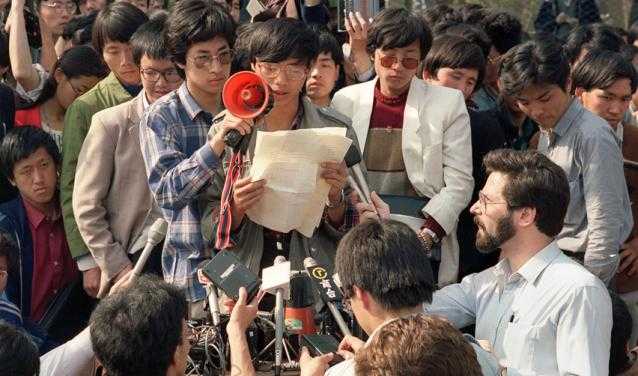Home>1989, Tiananmen Square

27.06.2017
1989, Tiananmen Square
On June 26, 27 and 28, Sciences Po is hosting the International Asian Studies Conference. Over the three-day conference, participants from around the world will get to hear leading specialists of the region speak about their latest research. For the occasion, Sciences Po has invited a major witness to Asia's development: Wang Dan, one of the main spokespersons of the Tiananmen Square movement in 1989 and a strong advocate of democratic change to this day. Jean-Philippe Béja, China specialist and CNRS emeritus senior researcher at Sciences Po - CERI (Centre de recherches internationales), outlines the contributions of a committed campaigner for democracy.
Wearing a headband marked with the characters jue shi (hunger strike), his eyes hidden behind tortoiseshell glasses, Wang Dan addresses the crowd in Tiananmen Square through a megaphone. This image of the twenty-year-old student became a symbol of the massive popular movement that destabilized the Chinese Communist Party in the spring of 1989. Wang, a professor's son and second-year history student at the prestigious Beida (Beijing University), became one of the main spokespersons for a pro-democracy movement that was followed intently by TV audiences worldwide.
One of the most mature young dissidents of his generation
A brilliant student, Wang set up the Democracy Salon at Beida in 1988, which became a nerve centre for the discussions on China's democratisation that had young people in ferment. He was close to Fang Lizhi, the Chinese Sakharov, and appeared one of the most mature young men of his generation. In 1989, Wang took part in the movement from the outset. He worked with other friends to set up the Beijing Students' Autonomous Federation, which found itself at the forefront of the movement. Wang was cool-headed and rather reserved—unlike the other spokesman for the movement, Uighur student Wuerkaixi—yet he did not hesitate to join Wuerkaixi in launching the hunger strike that led to the occupation of Tiananmen Square from 13 May 1989. Despite infighting among the students, Wang remained one of the movement's spokespersons and was appreciated by the foreign media for his analytical skills. On 19 May, he took part in the dialogue with Prime Minister Li Peng, who refused to make any concessions and proclaimed martial law.
Imprisoned for “plotting against the government”
Number one on the government's wanted list after the June 4 massacre, Wang was sentenced to four years in prison for “counter-revolutionary propaganda and agitation.” Upon his release from Qincheng Jail, he resumed his pro-democracy activism with Liu Xiaobo, the still-incarcerated 2010 Nobel Peace Prize laureate, and historian Bao Zunxin, head of the Beijing Intellectuals' Autonomous Federation in the Spring of 1989. With them, he started petitions, founded support groups for the families of political prisoners and denounced the regime's abuses, which led to his arrest in 1995; in 1996 he was sentenced to eleven years in prison for “plotting to overthrow the government.”
Dissident in exile
In 1998, on the eve of Bill Clinton's visit to China, Wang was allowed to travel to the United States. Anxious to complete his education, he enrolled at Harvard and graduated with a PhD in history in 2008. He has worked in a number of American universities and for several years now has taught Chinese history at Tsinghua University in Taiwan, while continuing his efforts for the democratisation of his country. He sits on the editorial boards of several pro-democracy journals, writes many articles and manages to make his ideas known in China via the Internet. He is highly respected in opposition circles in exile.
Jean-Philippe Béja, CNRS emeritus senior researcher at Sciences Po's CERI (Centre de recherches internationales)
Wang Dan will speak at two conferences at Sciences Po during Asia Days:
• 27 June 2017
Democracy in Asia. A Discussion around Wang Dan, Former Student Leader of the 1989 Pro-Democracy Movement.
Introduction by Karoline Postel-Vinay, senior researcher, Sciences Po - CERI, and Jean-François Huchet, vice-chair of the Academic Council, INALCO. Moderated by François Bougon, Le Monde.
Émile Boutmy lecture theatre, 6pm to 7.30pm
This conference will be broadcasted via livestream
• 28 June 2017
Beijing, Tiananmen 1989: A Prefiguration of the “Occupy” Movement? A Testimony by Wang Dan, Student Leader of the 1989 Pro-Democracy Movement.
Introduction by Jean-Philippe Béja, CNRS emeritus senior researcher, Sciences Po - CERI.
CERI conference room, 6, rue Jacob, 75006 Paris, 5pm to 7pm
Find out more